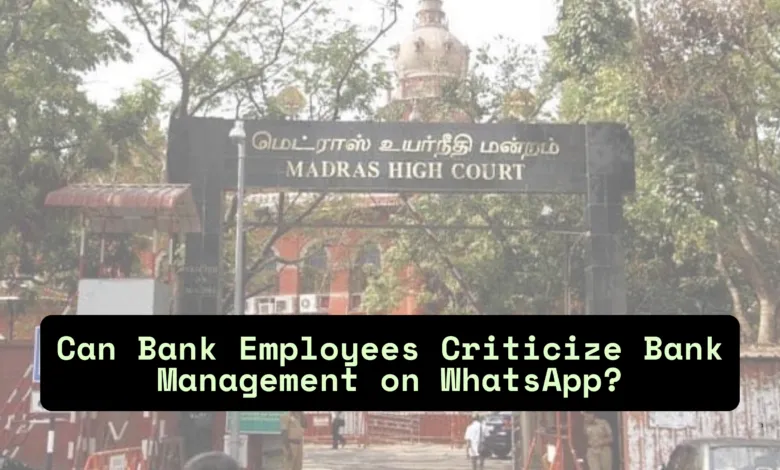Can Bank Employees criticize Bank Management on WhatsApp? Read Madras High Court Order

Can Bank Employees criticize Bank Management on WhatsApp? Recently, a bank employee was suspended by Punjab National Bank for violating social media policy. This has raised questions on the social media usage by Bank employees. Let’s have a look at the court case related to this. Similar case was filed in Madras High Court and the court ruled in favour of employee.
The Madras High Court ruled on a case involving an employee of Tamil Nadu Grama Bank, where the court set aside a charge memo issued against the employee. The court emphasized that employees have the right to express their emotions and feelings and the management cannot take action against employees for expressing critical views in private WhatsApp group chats, as long as the messages are within legal boundaries.
Right to Express Feelings and Employee Grievances
Justice GR Swaminathan, from the Madurai bench, explained that every employee has natural grievances and issues with the management. It is essential for organizations to allow these complaints to be expressed, as it helps to release frustration and improve overall morale. If the organization’s reputation is harmed as a result, management can intervene, but only when necessary. The judge pointed out that if such criticism happens during casual conversations, like over a cup of tea, it cannot be punished. Similarly, if these conversations happen in a private WhatsApp group, they should not be treated differently.
Freedom of Speech for Government Employees
The court also addressed the balance between an employee’s right to free speech and the restrictions placed on government employees. It pointed out that while government servants don’t have the same extent of freedom as private citizens due to conduct rules, they still retain fundamental rights, including the right to express their opinions. The court compared this to the rights of prisoners, noting that even they retain fundamental rights. This means that even when an employee becomes a government worker, they cannot be stripped of their constitutional rights under Article 19(1)(a), which guarantees freedom of speech and expression.
Privacy and Virtual Platforms
In its ruling, the court stressed the importance of respecting privacy, especially in private settings. It explained that just as a conversation at home should remain private, so should discussions within a private WhatsApp group. The court rejected the idea of “thought-policing,” where management tries to control or monitor personal opinions expressed in private. The use of modern digital platforms like WhatsApp should not be treated differently from private, in-person discussions.
Group Privacy and the Legal Limits
The court also highlighted the concept of “group privacy.” Just as individual privacy is recognized, the privacy of a group, as long as they are not violating the law, should also be respected. If the group messages are about a crime or anything illegal, then the management can take action. However, if the messages are just casual discussions about common interests, there should be no interference. The court also noted that if management obtained information about these messages through unauthorized means, like spying, no action could be taken against the employee.
Conclusion: No Charges Against the Employee
In this case, Lakshminarayanan, a bank employee and trade union activist, had posted critical messages about management decisions in a WhatsApp group. The court acknowledged that he was simply expressing his right to vent his frustrations. Although his messages were considered distasteful, he had apologized when this was pointed out. Given these circumstances, the court decided to quash the charge memo and ruled in favor of the employee.
Justice Swaminathan referred to previous judgments from other courts to support the decision, reinforcing the idea that employees should not face punishment for expressing their grievances in a lawful manner. The court emphasized the importance of respecting both individual and group privacy in the digital age.
Court Order PDF
Access the official court order PDF. Premium Users Only.
